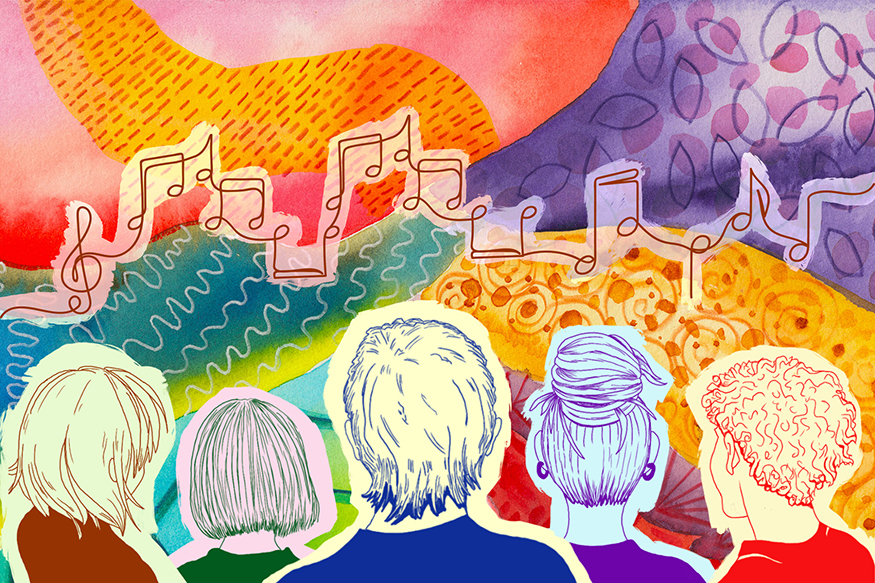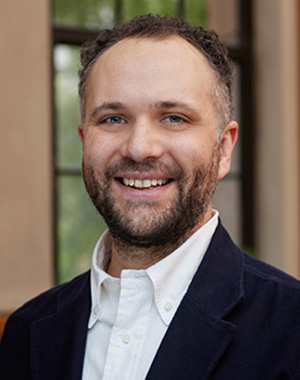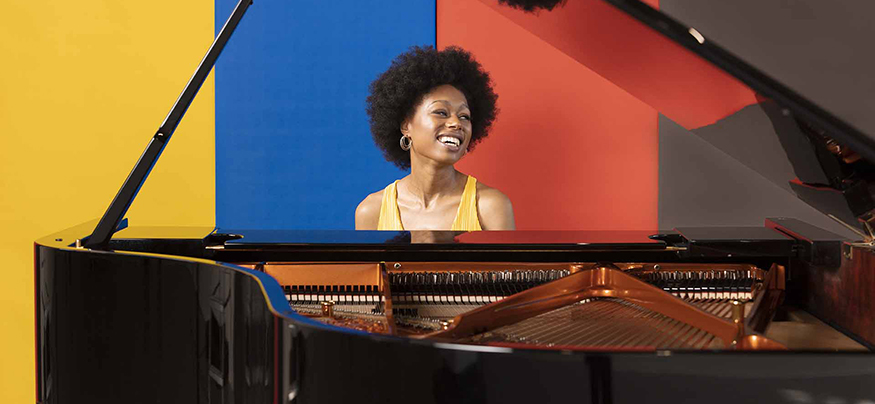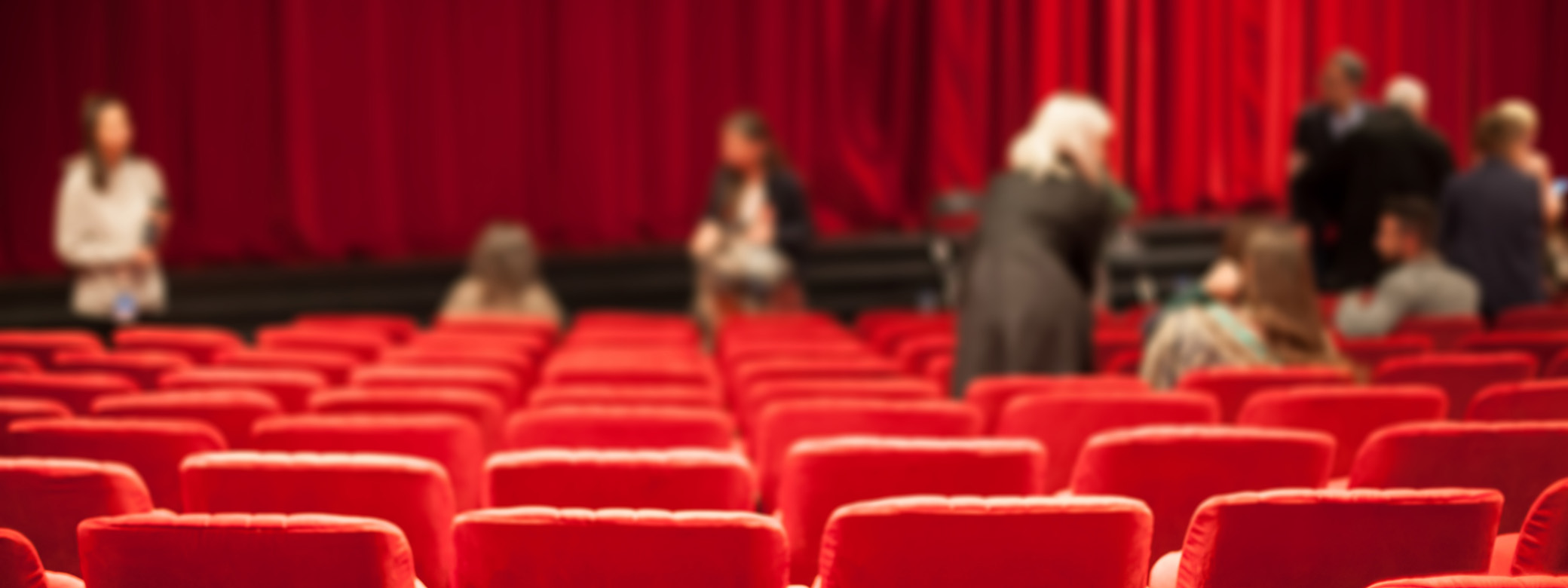
Mark Rodgers attended concerts from an early age. Raised in a musical family, he was so moved by a live performance of Vivaldi’s "Four Seasons" at age five that he started taking violin lessons the same year. Now he wants UW students to experience that same wonder. Or at least develop an appreciation for live classical music.
Rodgers, assistant teaching professor of music history, teaches “The Concert Season,” a School of Music course built around performances of classical music and jazz. For years, the two-credit course involved attending ten School of Music concerts and weekly lectures. Rodgers was asked to redesign the course in 2020, at the height of the Covid pandemic.

“When I took the course over, there was no School of Music concert season because of the pandemic,” Rodgers says. “I had to totally rethink how to teach it.”
Rodgers created an asynchronous online course that featured live-stream events and recordings of musical performances. He also recorded weekly lectures and Zoom interviews with artists to provide context for the performances.
“I was committed to supporting local musicians who were going through a difficult period,” Rodgers says. “I partnered with a number of local concert-presenting organizations that were creating virtual remote offerings. I still honored the spirit of the course — attending concerts — but I focused less on School of Music performances.”
When Covid waned and audiences returned to concert halls, Rodgers could have reverted to the course’s original format. But the asynchronous course had been so successful that he decided to combine the best of both approaches. The class remains asynchronous, with course lectures and podcasts posted online. Students choose from a menu of more than 50 on- and off-campus concerts to attend — most in person, some online.
As Rodgers plans lectures and podcast episodes for the course, he keeps in mind that many students have limited familiarity with jazz and classical music. In an introductory lecture, he shares his own conflicted feelings about the term “classical music.” (He prefers the phrase “concert hall tradition.”)
I provide historical background as context, but I want them to listen to the music on their own terms.
“As a teenager, I hated the idea of ‘classical music’ because the term implies a style of music that transcends its historical circumstances to be the best timeless music,” he says. “But there’s nothing inherently timeless about the music. New works enter and old works exit the standard repertory all the time.”
Rodgers tells students how he rebelled against his violin and viola training as a teen. In college, he played in rock bands and his academic focus became early (pre-1600) music performance and research. He says he hasn’t turned his back on “classical” music but doesn’t glorify it either.
“I love listening to Beethoven, but I cannot stand Beethoven worship,” he says. “Squaring those two things for me is what I want to bring to the students. I provide historical background as context, but I want them to listen to the music on their own terms.”
The course also touches on diversity, equity, and inclusion in the classical musical world. Rodgers felt it was important to address what’s happening in a community that has often been perceived as elitist. “There’s been a real reckoning in classical musical circles,” he says. “I try to emphasize the ways in which the classical music world is confronting its own history of elitism, its history of white supremacy, its history of exclusivity.”

During the pandemic, students in the course all watched the same concerts, and course lectures were specific to those performances. Now, with 50 concert options to choose from each quarter, Rodgers’ lectures are broader in scope. They can be watched in any order and cover topics such as musical romanticism, musical modernism, and classical symphonies. Rodgers and the course’s teaching assistants try to point students to the lectures most relevant to the concerts they plan to attend.
Weekly podcasts provide additional information. Rodgers’ podcast guests have included School of Music faculty, other local and national artists, and people behind the scenes in the music world. “It’s just so fun to sit down with people and talk with them about their careers and what it is that makes them tick musically,” Rodgers says. The podcast is exclusively for his students, with new episodes presented each quarter.
Students revisit the course lectures and podcasts in a reflection survey after each concert they attend. They are asked to describe their experience of the concert and connect it with something they learned in the course. Their insights sometimes surprise Rodgers. “There have been times when I thought, ‘Wow, I never would have made that connection, but that’s actually really interesting,’” he says. “I appreciate them seeing things in a different way than I do.’”
The course currently attracts up to 400 students — up from 150 students pre-pandemic — and is offered three quarters each year. Rodgers has no illusions that every student in the class will connect with classical music as he did early in life, but he does hope they become comfortable in the concert setting. Student feedback at the end of the quarter suggests that they do.
“Students who had no context for classical music or jazz mentioned being excited that they know more than they did at the outset,” Rodgers says. “They might not be experts, but they feel more confident sitting in a concert hall where people are playing classical music or jazz, and more confident talking about what they heard and saw. Gaining that confidence is a main goal for the course. But most of all, I want students to experience how much fun it is to go to concerts.”
More Stories

Bringing Music to Life Through Audio Engineering
UW School of Music alum Andrea Roberts, an audio engineer, has worked with recording artists in a wide range of genres — including Beyoncé.

A Healing Heart Returns
In February, the UW Symphony will perform a symphony that Coast Salish elder Vi Hilbert commissioned years ago to heal the world after the heartbreak of 9/11. The symphony was first performed by the Seattle Symphony in 2006.

Need a break from holiday movies? Try these
For those wanting a break from holiday movies, Cinema & Media Studies faculty and grad students offer suggestions.
